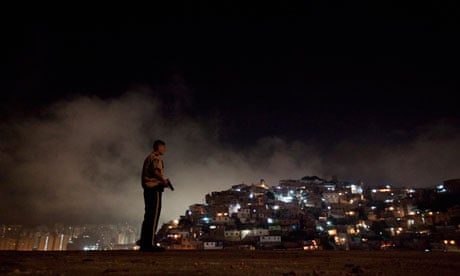In a country that wakes up every Monday morning to a dismal tally of weekend murders, it is no surprise that people have turned to the saints for help.
But the holy men invoked in Venezuela are anything but virtuous. In a nation with one of the highest murder rates in the world – a staggering 14,000 a year on average – where locals often joke that they would be safer if they lived in Baghdad, even the beatified carry guns.
Welcome to the cult of Ismael and the Holy Thugs, a curious blend of spiritualism and hero worship that comes with its own quirky iconography: chiefly garish figurines with baseball caps on back to front, cigarettes dangling from their mouths and guns stuffed into their belts.
Ismael and his posse are the latest addition to the María Lionza cult, a religion that believes the dead coexist with the living and can be channelled through medium-like people.
Take Freddy Castro. When he was thrown in jail his mother was desperate with worry and hired a lawyer. More tellingly, however, she prayed to Ismael for help. To this day she credits Freddy's release not to the Venezuelan judicial system but to the holy thughood.
According to the anthropologist and cult expert Professor Daisy Barreto from the Universidad Central de Venezuela, the Holy Thugs – or Santos Malandros – started gaining adherents after the Caracazo, three days of rioting that tore through the streets of Caracas in 1989 and threatened to topple the longest standing democracy in the region.
"The María Lionza cult, unlike Catholicism, is not static and constantly incorporates new 'saints' who reflect the country's situation," said Barreto. "The mediums started receiving these thug-like figures to reflect the wave of crime that the country has experienced after the Caracazo."
What is perhaps most peculiar about the cult is the diversity – indeed duality – of its devotees. Ismael is sought both by people who want protection from crime, and by criminals who need help carrying out their illegal activities.
"In one day I can receive a mother who wants Ismael to turn her child away from drugs or crime, and a boy who wants Ismael to help him find a gun," said Santiago Rondon, a brujo or spiritualist priest from the cult. "Ismael was a thug but he wasn't a bad thug. He stole to give to the people, and not for his own gain, so this gives him the ability to connect with both sides."
Ismael does more than just understand his devotees, however. With countless versions of who exactly he was and how he lived, Ismael reflects Venezuelans' hopes and fears. "He is our mirror," says Berta Carvallo, a teacher in a low-income area of Caracas.
At the core of believing is the idea that Ismael, who was killed by a "bad cop", has come back to seek redemption and that by doing well he will finally achieve a peaceful rest, or the justice he was denied in life.
Ricardo Bolivar, a community leader in Guarataro, one of the poorest and most dangerous parts of western Caracas, explained the thinking of those who look to the cult for help.
"He can answer our prayers because he has walked down the same streets as we have," he said. "He knows what we live, what we suffer. We didn't inherit him from the Spanish.
"You find Ismael and the need for alternative faiths here, in the places where formal law doesn't reach, where we have been failed by the formal structures and are forced to develop our own means."
